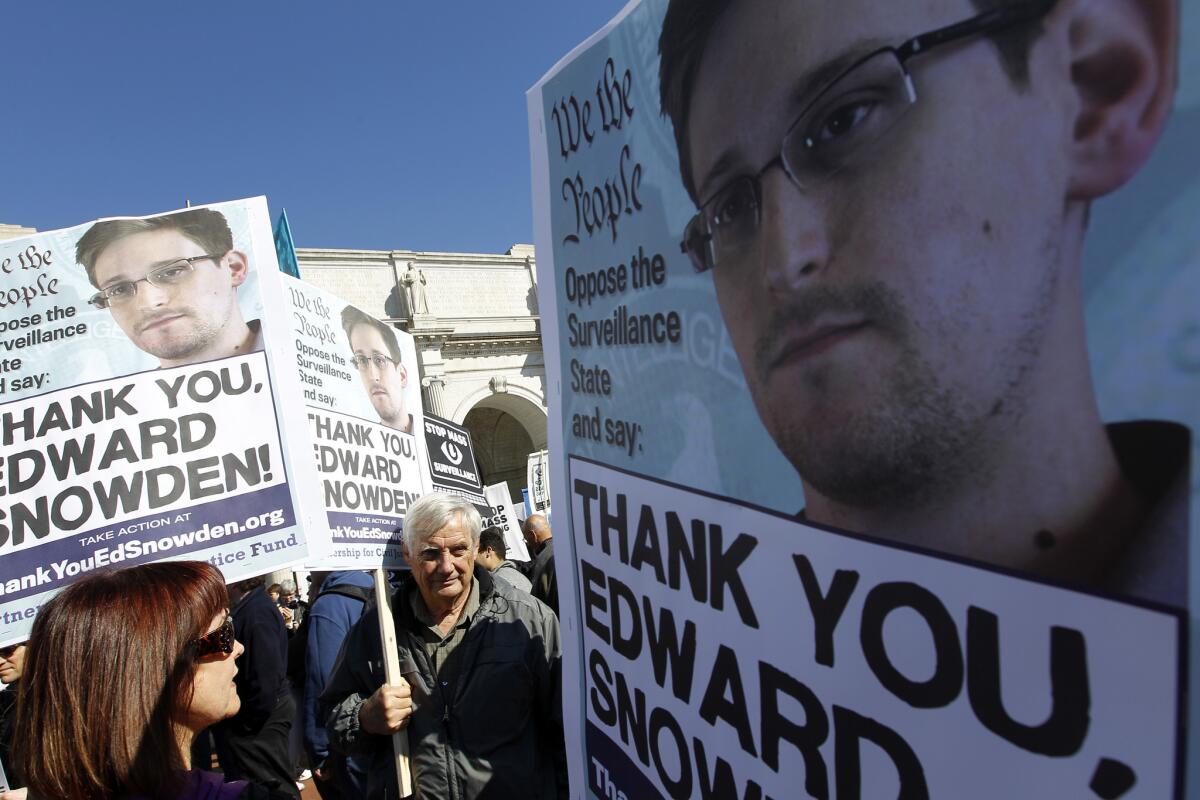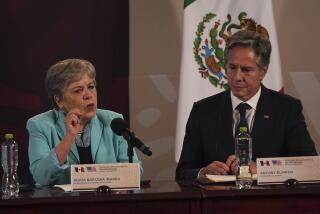Nearly 6 months into Snowden affair, opinion still split on motives

- Share via
James Costos, the U.S. ambassador to Spain, was called on the Foreign Ministry carpet Monday to be informed of the Madrid government’s anger over reports that U.S. intelligence spied on 60 million phone calls in Spain in one month alone.
His counterpart in Paris, Ambassador Charles Rivkin, had his turn in the diplomatic hot seat a week earlier, when the French foreign minister summoned him to address similar reports of massive U.S. surveillance of French communications.
German Chancellor Angela Merkel, upon hearing reports that the U.S. National Security Agency had been monitoring her personal cellphone calls as recently as 2010, went straight to the top, venting her ire directly to President Obama.
Nearly six months into the controversy spurred by former NSA contractor Edward Snowden, the damage to America’s image as a reliable ally and rights-respecting democracy continues to spiral out of control.
Snowden, now living in obscurity in Russia after being granted temporary asylum there in August, remains at the center of an unresolved debate about whether his actions are those of a whistle-blower exposing U.S. government excesses or of a criminal revealing highly sensitive intelligence-gathering secrets.
International security experts tend to see some value in Snowden’s leaks as having opened the conversation about whether massive surveillance is legal, necessary and productive in fighting terrorism.
Privacy rights advocates and groups battling what they see as Big Brother-scale snooping tend to applaud Snowden’s actions. But legal experts more often point to his violation of confidentiality commitments and potential damage to counter-terrorism programs.
Philip Bobbitt, director of Columbia University’s Center for National Security Law, argues that “data mining” of known terrorism suspects -- computer scans and analysis of phone numbers; email and home addresses; passport records; and the time, duration, connections and location of phone calls and text messages -- can help intelligence agents intercept terrorist plots.
If U.S. intelligence had collected all the available metadata on the two known terror suspects traveling on Sept. 11, 2001, all 19 suicide hijackers might have come to airport authorities’ attention, Bobbitt said during a discussion at Stanford University’s Hoover Institution.
Others see the leaker’s actions as having put the U.S. intelligence community’s behavior up for public debate and reflection on the degree to which Americans are willing to sacrifice privacy for heightened security.
“It’s too soon to tell,” said Amy Zegart, co-director of Stanford University’s Center for International Security and Cooperation. “We don’t know what is left for Snowden to reveal or how to weigh the benefit of that to the public.”
The international outrage stirred by Snowden’s revelations are illustrative of “the perils of living in the Information Age,” Zegart said, with secrets harder to hold in such huge quantities of computer-accessible data.
But recent comments attributed to Snowden “are increasingly disturbing to me,” she said, recalling the fugitive’s reported statement that intelligence programs kept secret from the public are inherently illegal.
“Is Edward Snowden a hero or a criminal?” ponders Benjamin Wittes, editor of Lawfare and a senior fellow in governance studies at the Brookings Institution. He sees elements of both figures in the 30-year-old wanted in the United States on felony charges of disclosing national security secrets.
“There is some value to the conversation,” Wittes said of the public and the intelligence communities’ self-examination in the wake of the scandal. But Snowden is accused of “a set of criminal acts that justifiably warrant prosecution.”
And, Wittes commented, “patriots don’t take large quantities of data to Russia and China.”
[For the record, 2:36 p.m. Oct. 29: A previous version of this post omitted Bobbitt’s assertion that data-mining of the previously identified terrorism suspects involved in the Sept. 11 attacks could have led to identifying all 19 suicide hijackers traveling that day.]
ALSO:Egypt: Attack in Nile Delta leaves three police officers dead
Tiananmen Square attack sows terror in spiritual heart of China
L.A.-bound man carrying bomb parts detained at Montreal airport
Twitter: @cjwilliamslat
More to Read
Sign up for Essential California
The most important California stories and recommendations in your inbox every morning.
You may occasionally receive promotional content from the Los Angeles Times.











